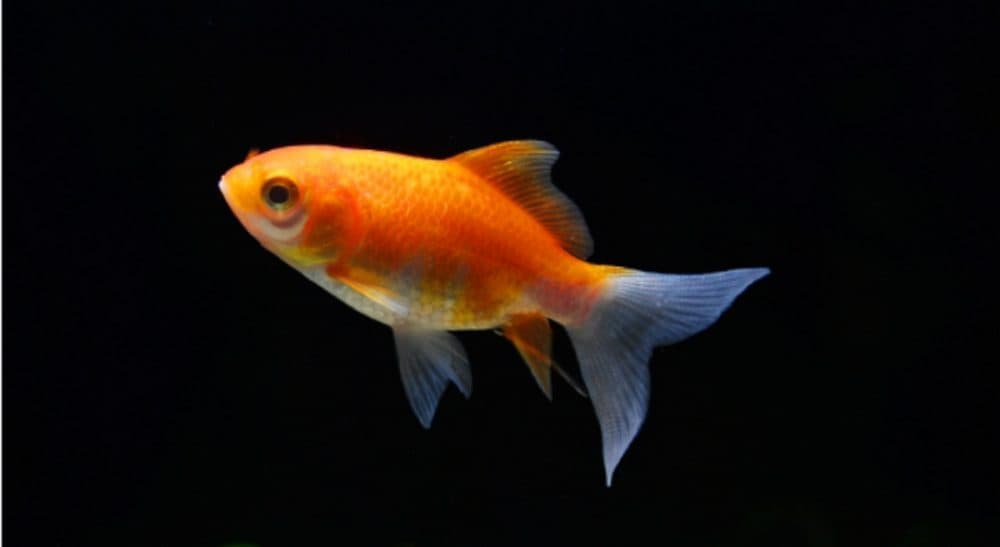Advertisement
Our Goldfish Looks Depressed

One dog, two cats, a gecko, a frog and a goldfish: Our home could have given Noah a run for his money as an animal caretaker. I like pets as much as the next guy, but our 11-year-old’s soft spot for creatures came with a naturalist’s fascination with life forms. “No more pets,” I’ve pleaded over the years, only to come home to a new family member — warm- or cold-blooded, it made no difference. We even had a praying mantis, until it passed on to that great leaf pile in the sky.
So damn Jessica Pierce. Thanks to her, I’ve recently endured multiple trips to the pet store, headaches over pet contraptions, and a two-thirds increase in the organisms under my roof. And it was all my idea, the result of a guilty conscience pricked by Pierce and the latest animal cognition research. Therein lies a moral.
'No more pets,' I’ve pleaded over the years, only to come home to a new family member -- warm- or cold-blooded, it made no difference.
Pierce, an independent scholar and bioethicist, wrote a piece in The New York Times earlier this month about our deepening awareness of, well, other animals’ awareness. It’s hardly news that advanced species are sensitive and can suffer; that’s why the government is discontinuing unnecessary medical research on chimps, and why public pressure led Ringling Bros. to announce it will free its elephants, and Sea World to stop breeding orcas. I also knew that seemingly simpler animals show surprising intelligence. Octopi and squid can unscrew a lid; a striped bass hooked by an angler may wrap the line around a rock, knowing it could shear when the fisherman tries to reel in his catch.
But when Pierce suggested that goldfish are likely more sentient and capable of suffering than we assume, I winced. For seven months, we had kept Azetiki in solitary confinement in an unadorned fishbowl less than a foot in diameter. I couldn’t get over Pierce’s own confessional: “The more I’ve learned about goldfish — they are more intelligent than we think, feel pain and engage in socially complex behaviors — the guiltier I feel that I subjected several of these creatures to a life of endless tedium, swimming circles in a small bowl on my daughter’s dresser.”
I stunned my wife and the babysitter by proposing that we get a bigger home and a companion or two for Azetiki. Kieran welcomed the idea, however, and I thought it would be a great father-son bonding adventure, so we headed to the pet store.
Our goldfish had survived with simple care — regular water changes and purifying — so I assumed the same drill would work with larger quarters. Of course, I was wrong; a tank requires a filter, among other accessories. After lugging a tank set home, we read the filter instructions, and it seemed to be missing parts. I raced back to the store, only to be told that most of the filter had been pre-assembled.
That was a relief, until we realized we’d lost the fish care brochure. At the risk of a stalking complaint from the fish saleswoman, I trekked a third time to the store for a replacement. Then the filter went on the fritz. By now, I was cursing what seemed to be one of the dumber ideas of my tenure on earth. My wife, a patient and intuitive tinkerer, spared me a fourth trip and got the filter bubbling happily again.
Advertisement
Kieran had to make several more pet store runs with the sitter to test the tank water’s quality before we could populate it. Finally, Azetiki was introduced to his new home, along with four new companions, plants and the equivalent of a piscine playground -- tubes and figures to swim through and around, to make life a little more interesting.
I stunned my wife and the babysitter by proposing that we get a bigger home and a companion or two for our goldfish, Azetiki.
The moral? For years, animal rights activists have futilely denounced everything from inhumane treatment of factory-farmed animals to the cruelty of keeping certain advanced species in captivity. They’ve largely been ignored. But the corporate and government actions to free animals mentioned above demonstrate the activists were right. Yes, some animal lovers seem to think human welfare doesn’t take priority. But smart ones don’t.
They merely insist that any person considering herself moral or progressive shouldn’t exhibit the same cluelessness she mistakenly attributes to animals, but rather pay attention as science expands our understanding of nonhuman minds.
Meanwhile, Azetiki and company seem to be thriving, insofar as I can judge fish-ly contentment. Tank care remains a bit of a hassle, but our family members all pitch in. Jessica Pierce made life a little more complicated. But she’s made my sleep a lot easier.
